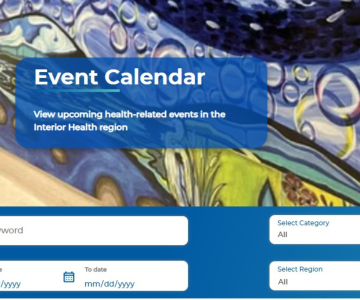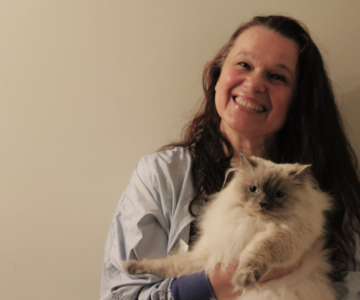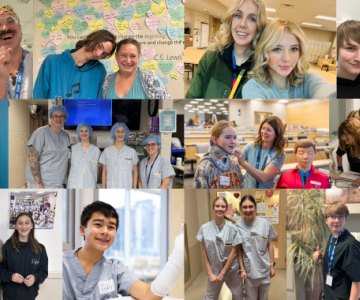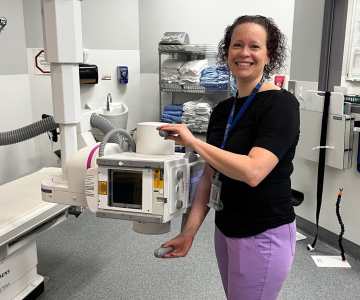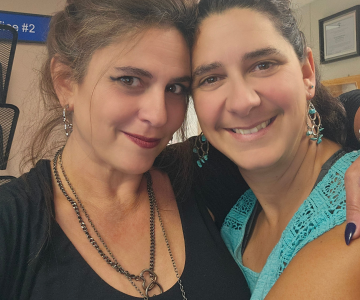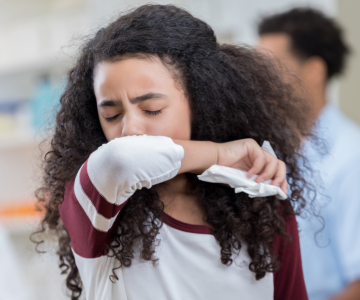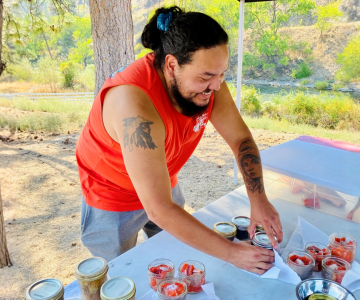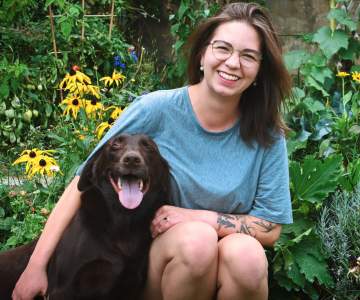Breadcrumb
Explore Stories
Health & Wellness
We have launched a new event calendar on our website at https://www.interiorhealth.ca/event-calendar. Check out the calendar to view health-related events happening throughout the Interior region, from the Thompson Cariboo Shuswap to the East Kootenay, and everywhere in between.
Here are five reasons you'll want to bookmark IH's new event calendar.
Community & Culture
Name: Ilka Stoyanova Chobanova (she/her/hers) Job Title: Registered Nurse, Peripherally Inserted Central Catheter (PICC)Length of Service: 18 years Worksite: Royal Inland HospitalCommunity: Kamloops Ancestral Territory: Secwépemc Favourite Quote / Advice to Live By: My favourite word is “Today.” My favorite quote is by Maya Angelou: "Do the best you can until you know better. Then, when you know better, do better." My philosophy is to do the right thing when nobody is watching; it’s the definition of integrity and one of the pillars of my moral code.
When Ilka Chobanova immigrated to Canada in 2003, she didn’t know how to speak English. Three and a half years later, she started working as a registered nurse (RN) with Interior Health.
“I remember feeling quite stressed when I had to talk on the phone with my health-care colleagues,” says Ilka, who was an internationally educated RN and had worked in Bulgaria and Germany. “At one point, I wanted to create a ‘survival kit’ for the future internationally educated nurses.”
Nearly 20 years since her IH career began, Ilka has made a tremendous impact. She specializes in peripherally inserted central catheter (PICC) nursing. She assists patients when IV access is needed for bloodwork, CT scans or even chemotherapy treatments.
She was a 2025 regional winner for Western Canada in the CVAA/BD Excellence in Vascular Access Management & Infusion Therapy Awards. The awards recognize the important contributions made in vascular access management and infusion therapy practice with a focus on peripheral IV therapy. It was the first time a team member from Royal Inland Hospital (RIH) has been recognized with the award.
Community & Culture
Grade 9 students from across the Southern Interior region joined Interior Health (IH) on Nov. 5 for Take Our Kids to Work Day 2025—and what a turnout it was!
This year saw record participation with students exploring more than 30 departments in over 10 communities.
From patient care to administration and everything in between, IH teams opened their doors to give students a hands-on look at the many exciting and meaningful careers in health care.
Whether diving into skills workshops, shadowing staff, or getting a behind-the-scenes look at hospital operations, students enjoyed a day filled with discovery, inspiration and fun.
Community & Culture
Name: Erica Lynn McDivittJob Title: Interim Clinical Educator for RadiologyLength of Service: 21 Years
Worksite: Royal Inland HospitalCommunity: KamloopsAncestral Territory: Tk’emlups te SecwepemcFavourite Quote / Advice to Live By: “When given the choice between being right and being kind, choose kind.”
When Erica Lynn McDivitt entered the health-care field more than two decades ago, she wanted to help patients, and that’s still her main pursuit.
However, her focus has switched from being a frontline worker to helping mentor the next generation of X-ray technologists.
“Our job is very interesting. Having the privilege to share that knowledge and experience is what inspires me today,” says Erica. “I want to create positive experiences for not only patients but for my co-workers and the future generation of X-ray technologists.”
Community & Culture
When Marianne Danzalan left the Philippines to start a new chapter in Canada, she carried with her not only her experience as a physiotherapist but also a dream: to continue helping people move, heal and live better lives.
Five years later, that dream has become reality. In October, Marianne began her new role as a licensed physiotherapist with Interior Health (IH) at Nicola Valley Hospital and Health Centre in Merritt, B.C.
It’s been a journey filled with determination, courage and countless hours of hard work.
Community & Culture
Name: April Lee Anne Wright (she/her/hers)Job Title: Unit ClerkLength of Service: 11.5 yearsWorksite: West Chilcotin Health CentreCommunity: Tatla LakeAncestral Territory: Tŝilh qo t’inFavourite Quote / Advice to Live By: “We need to remember life doesn't need to be so complex. Stop, be present and find the joy in simply being able to walk in the splendor around us.” —April
April Wright, a unit clerk at West Chilcotin Health Centre, loves being part of her small remote community. When she’s not in the clinic helping and caring for her fellow community members, she’s getting her hands dirty in her garden or exploring the forest with her dogs.
“There is something so simple and soothing about being in the garden helping things grow, or walking in the forest in the winter with my dogs admiring the wonderful things nature has given us. It sets the world right for me.”
April enjoys helping people, advocating for their needs, and being available during difficult times in their lives. She can offer them comfort and human connection in a community where services and access can be limited.
“Living and working in a small remote town gives me a larger sense of purpose since the patients we're caring for aren't just patients: they’re friends, neighbours and people we love and spend time with. We are fortunate enough that we get to share their joys with them, and we are blessed to be able to offer them empathy and comfort on some of the most difficult days of their lives.”
Health & Wellness
As the weather cools down and flu season ramps up, taking a few extra precautions can make all the difference in staying healthy. Influenza and other respiratory illnesses spread easily, especially in workplaces, schools and health-care settings. With a little care and preparation, you can reduce your risk of getting sick or passing illness to others, so you can focus on what matters – like cozying up with a pumpkin spice latte.
Read on for five simple doctor approved tips to help you and those around you stay healthy this flu season.
Community & Culture
This is part two in our three-part series that explores food literacy in schools in the Interior Health region.
Every Friday at Senpaq’cin School (pronounced Sen-Pok-Chin) in Oliver, students from kindergarten to Grade 7 take part in Fire Fridays, a land-based learning program that connects syilx language, culture and food sovereignty.
At the First Nations school, sessions begin with a talking circle where students explore traditional foods and culture, and the importance of honouring food systems and providers.
Students then move through hands-on learning stations, from art and drumming, to gardening and cooking. Each station is designed to spark curiosity and pride in cultural teachings. This season, students have been harvesting local ingredients and cooking their own meals from start to finish.
Community & Culture
Name: Olivia Duncan (she/her/hers)Job Title: Long-Term Care CoordinatorLength of Service: 18Worksite: Mountain View LodgeCommunity: LillooetAncestral Territory: Northern St'at'mic
Olivia Duncan, a long-term care coordinator for Mountain View Lodge, grew up in Lillooet on the traditional, ancestral and unceded Northern St’at’imc territory. She returned with her husband and two children in 2019 after living in Fort St. John and Penticton.
When Olivia was 17, she started working at Lillooet Hospital with Support Services with both the housekeeping and dietary teams. She thanks her supervisor at the time for taking a chance on a teenager!
She immediately fell in love with the energy of the hospital and thought the world of the nursing staff. “They were such a tight-knit community,” Olivia says. “And I wanted to be a part of that!”
Olivia pursued a career in nursing after high-school graduation and has been nursing since 2014. For her, it’s all about connection. In each area of nursing she’s worked, Olivia’s always found joy in building relationships with her patients, residents and their families.
She understands that being in a hospital or long-term care facility can be a very vulnerable moment in time for patients and their families. It's a really special moment when she’s able to take a bit of that worry away.
-
Load More
Showing 45 of 833
Sign up for email updates
Receive news, alerts, public service announcements and articles right to your inbox.


